No Answers for Dying Kids
While the dictatorship blames the U.S. for the deaths at Caracas Children’s Hospital, the causes seem to be negligence, underfunding and the international agreement for bone marrow transplants, before the OFAC sanctions.


Photos: Cristian Hernández y Luis Morillo
“My son died afraid.”
Deep inside the slum 12 de Octubre, Gilberto Altuve and Jessica Guerrero mourn the death of their 11-year-old, Erick, in a borrowed home. “He noticed other children dying in the hospital. He was afraid it would happen to him. And it did.”
Erick died on May 26th, due to lack of treatment for Hodgkin’s lymphoma. He was one of the 30 patients waiting for a bone marrow transplant, and the fourth child from that waiting list to die in the past month at the JM de Los Ríos Children’s Hospital, in Caracas. Giovanni Figuera (6), Robert Redondo (7) and Yeiderbeth Requena (8) were also getting chemotherapy to battle blood pathologies. Yoider Carrera (2) was the fifth registered death of the month, due to a brain tumor.
On April 9th, several mothers reported that their children, without compatible donors, were at risk of death. They spoke of 30 kids urgently needing bone marrow transplants due to life-threatening conditions, like sickle cell anemia with stroke, bone marrow aplasia, major thalassemia, acute lymphoblastic leukemia, high-risk myeloid leukemia and Hodgkin’s and non-Hodgkin’s lymphomas.
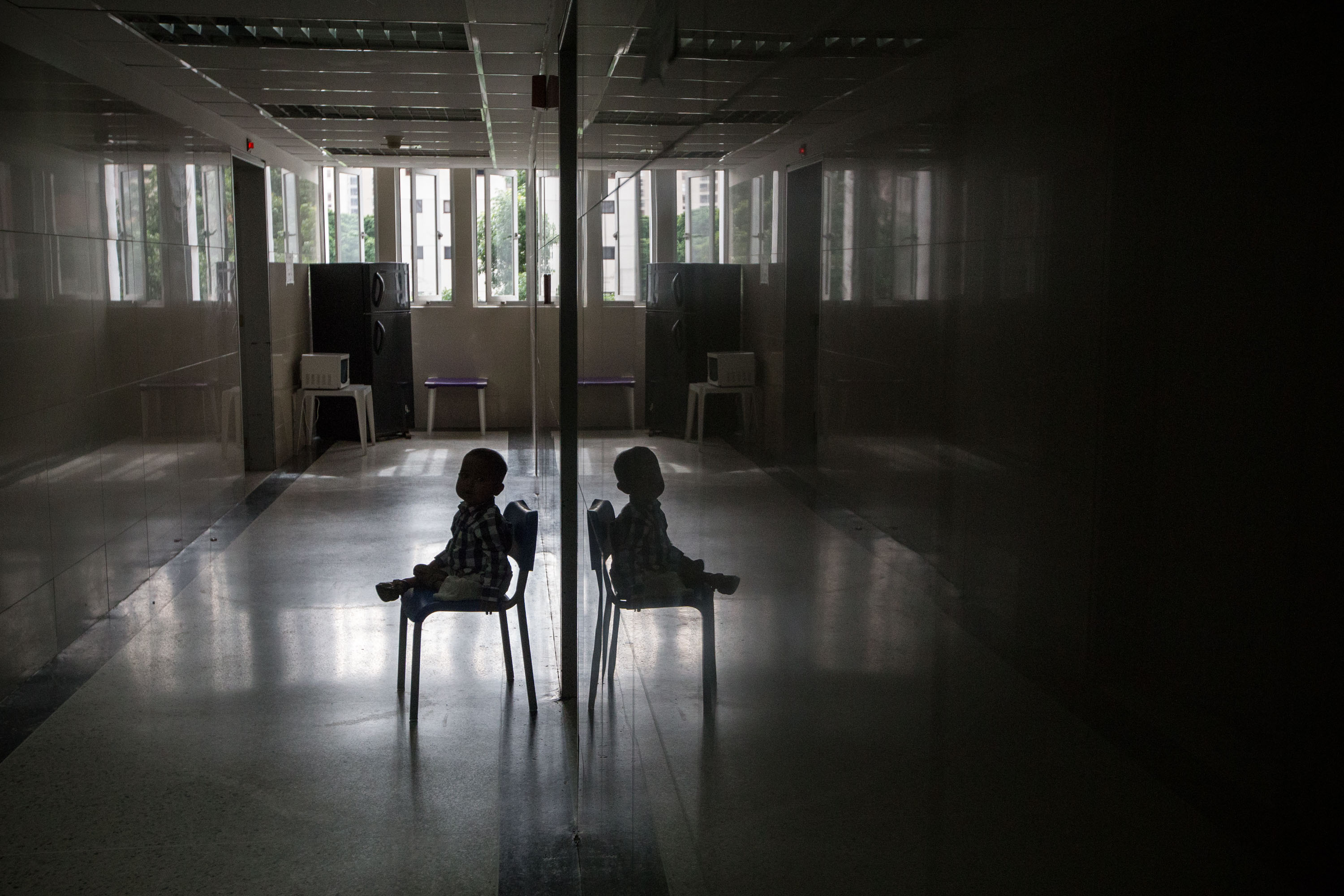
A child sits in a hall of the Hospital JM de los Rios, Caracas, 2017. Photo: Cristian Hernandez
They were supposed to benefit from a 2006 agreement between the governments of Italy and Venezuela, funded by PDVSA and CITGO, but the protocols to move them to Italy and get the transplants were delayed.
Katherine Martinez, human rights activist and founder of NGO Prepara Familia, says the agreement hasn’t been active during 2019 and all the transfers to Italy had been suspended. Last January, when the United States government imposed sanctions against PDVSA, the benefits stopped, and the scheduled trips to European hospitals were cancelled. Those on the list are now in limbo. The Simon Bolivar Foundation, which belongs to CITGO, sent a letter to all the concerned parents, claiming that it couldn’t make the program payments due to the U.S. sanctions.
No one from the Simón Bolívar Foundation or Centro de Comunicación Nacional answered Caracas Chronicles’ request for comments about the new National Assembly-appointed Board’s relationship with this foundation and the transplant program.
The thing is, our complex humanitarian emergency status excludes all health and food institutions from the effect of sanctions.

Erick’s school friends attend to his burial, which had to be suspended until the next day because of issues with the wire transfer to the person in charge of the cemetery plot. Petare, 2019. Photo: Cristian Hernández.
“My son didn’t die because of his disease, or because he couldn’t get the transplant on time,” said Wendy Guerrero to the press, during a protest in front of the Children’s Hospital on May 27th. “He died because he got an infection inside the hospital.”
“He’d been sick for the past decade and I’ve seen the hospital crumble over time,” said Gilberto as he caressed Jessica, who cried silently next to her son’s coffin. “Everyone who’s been inside knows that the place gets medicine and it’s locked away. Sometimes, doctors would give it to us and tell us not to say a word. It’s also hard for them to see how our children suffer even though there’s available meds.”
Pablo Zambrano, executive secretary for the Federation of Health Workers, denounced that Natalia Martinho, the director of JM de los Ríos Children’s Hospital’s, keeps medicine locked away and controlled, according to several testimonies from parents and workers from the hospital. “They get medicine but won’t pass it to doctors for patients. We’ve also seen the new cars sent by the Red Cross, but none of the supplies they send as part of the humanitarian aid. We saw the aid entering the country on TV, but it never appeared on the hospitals.”
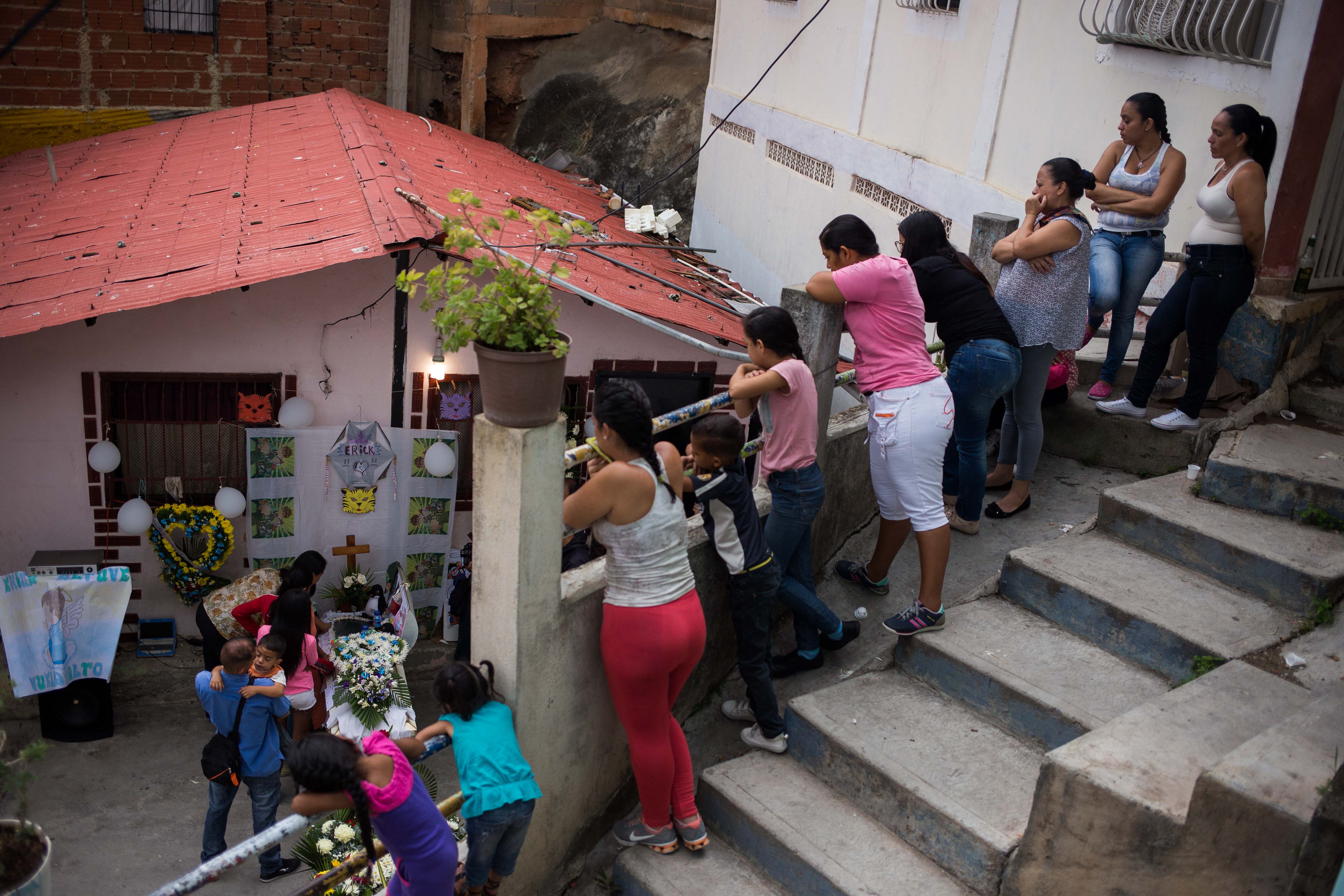
The death of a child affects the entire community. Barrios mourn, pray and talk about how rare this used to be and how normal it has become. Petare, 2019. Photo: Cristian Hernández.
Vietnam Vera, a physician who oversees patients with leukemia in the hospital, claims the health center has none of the requirements to make it functional: “The situation inside the hospital has been dire for a long while now. The X-Ray machine has been broken for the past four years, and there are no ambulances, tomographs or MRI scans. Infusion bombs and manual ventilators haven’t had maintenance for over a year. Currently, there are only two available beds out of 11 in the intensive care wing, due to lack of equipment. Air conditioners are broken in the A wing in Oncology. The sewage pipe system also collapsed and keeps flooding the third and fourth floors, precisely where children with complicated pathologies like measles, chickenpox, dengue and HIV are treated.”
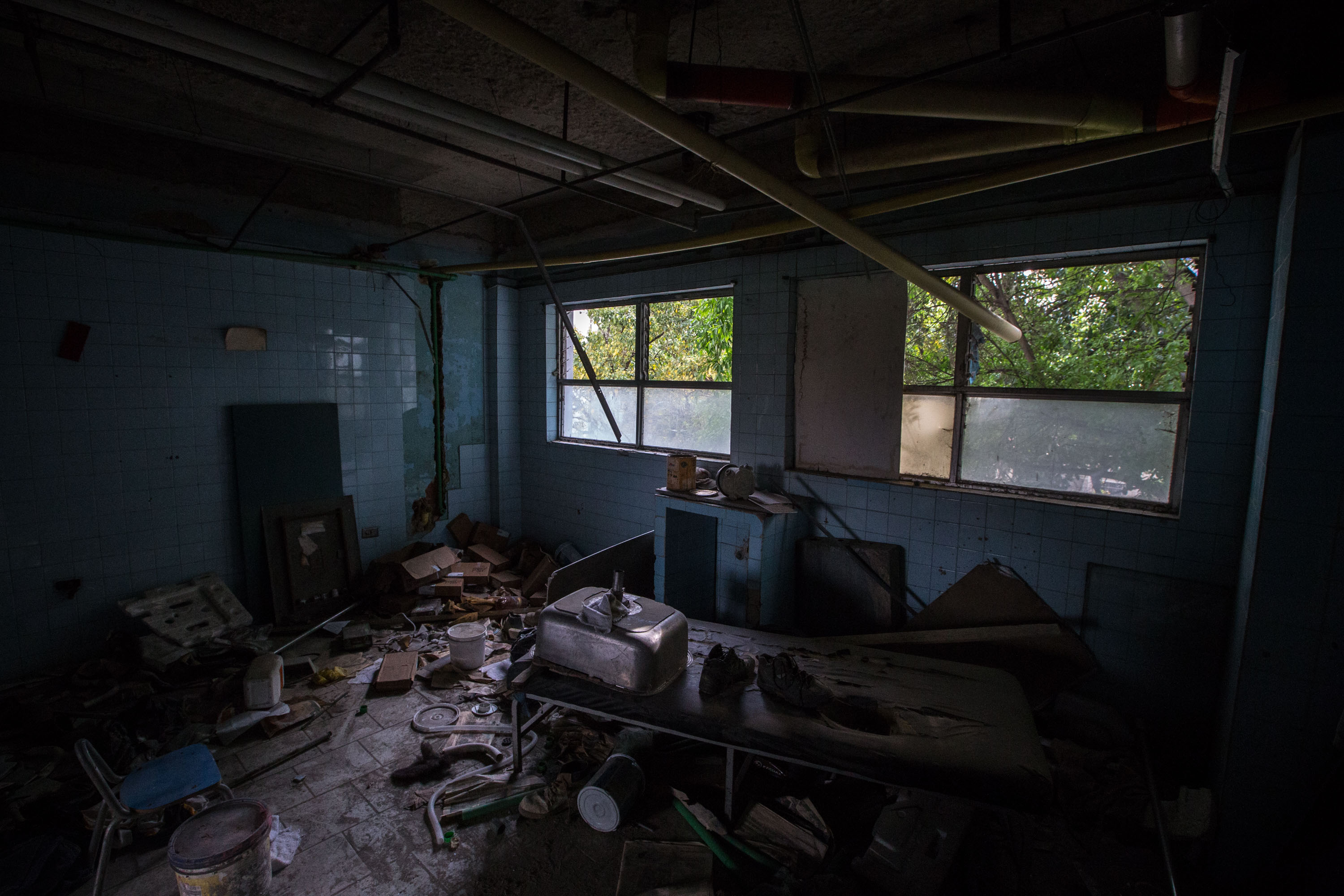
An abandoned room in the third floor of the JM de los Rios Children’s Hospital, where there is currently a flood due to a collapse from the sewage pipe system. Caracas, 2017. Photo: Cristian Hernández.
Nayiber Noguera from Fundavalientes, an NGO that aims to find food and medicine for the mothers and children from the hospital, denounces hospital negligence and agrees with Dr. Vera: “I could go on for hours, reciting the thousands of irregularities we see every day.”
It isn’t the first time this happens in the JM de los Ríos Children’s Hospital. In 2017, 12 children died in the nephrology service; in March 2019, after the first national blackout, two children died because the hospital’s power plant was broken; in 2018, Prepara Familia led a report to the CIDH, issuing a set of precautionary measures to make the hospital respect the children’s basic and fundamentals rights.
This is not a burial
The death of a child affects the entire community. Barrios mourn, pray and talk about how rare this used to be and how normal it has become. While Gilberto and Jessica mourned Erick in Petare, Wendy González celebrated both Yeiderberth’s birthday and burial: “If I had known he’d die before his birthday, I would have made his party sooner. This isn’t a wake, it’s a celebration of his life.”
She sang happy birthday to the casket, holding her youngest daughter, Samantha (3), in arms. Many neighbors, friends, family members and patients were indeed glad to enjoy Yeiderberth’s presence one last time.
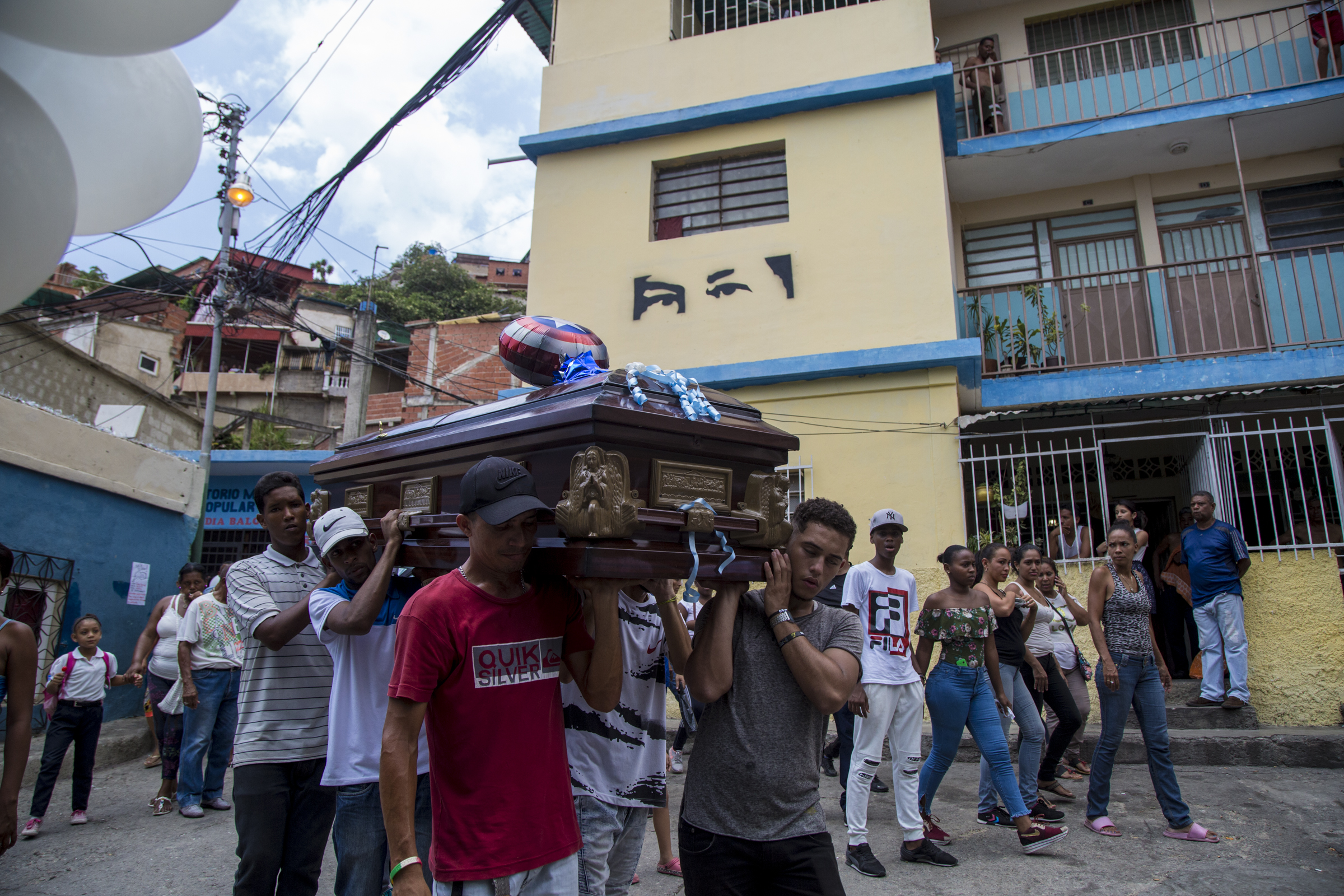
Even though his casket wasn’t white or small, neighbours from the Hugo Chávez Misión Vivienda complex in Catia la Mar knew this was a child’s funeral and joined the procession. Yeiderberth was buried in the Pariata Cemetery, where more people waited to offer him candy, popcorn and cake. La Guaira, 2019. Photo: Luis Morillo.
Even though Wendy blames his son’s death on the government’s negligence, Yeiderberth’s family celebrated his departure in a room with an arched entrance flanked by three images of the late Hugo Chávez, at Yeiderberth’s grandmother’s house in La Guaira, close to the sea. His friends held colourful banners: “You’ll always live in our hearts, you pup.” Rower, Yeiderberth’s brother, held his little sister’s hand; he became used to taking care of her when his mother was in the hospital; his brother’s illness forced him to drop his dreams of being a professional ballplayer: “I could hardly recognize him when he died, but he still had that spark. I told him I loved him before he passed.”
Héctor, another oncology patient from the hospital, went to Yeiderberth’s wake after his chemo session. He stood under the sun, sang to his friend and ate cake and popcorn while others treated him carefully. “I played with him just last week,” he said, before being carried in his mother’s arms to say goodbye to Yeiderberth inside the coffin.
Back in Caracas, Erick’s casket is adorned with drawings of his favorite anime, boxing gloves, toys and candy. “I’m a builder, but he always said he wanted to be an architect, to make money and take us out of the barrio,” said Gilberto.
The entire community attended the wake. “We never see any press around here,” said Elizabeth and Thamar Veroes, neighbors of the 12 de Octubre barrio for over 60 years. “It’s sad that they came for little Erick’s goodbye, but at least they see how we’re fading away. This area was full of little bodegas, now they’re all out of business. Many have left, our children die. We see what the government says on TV, but no one has seen the humanitarian aid. None of this sadness will ever be normal.”
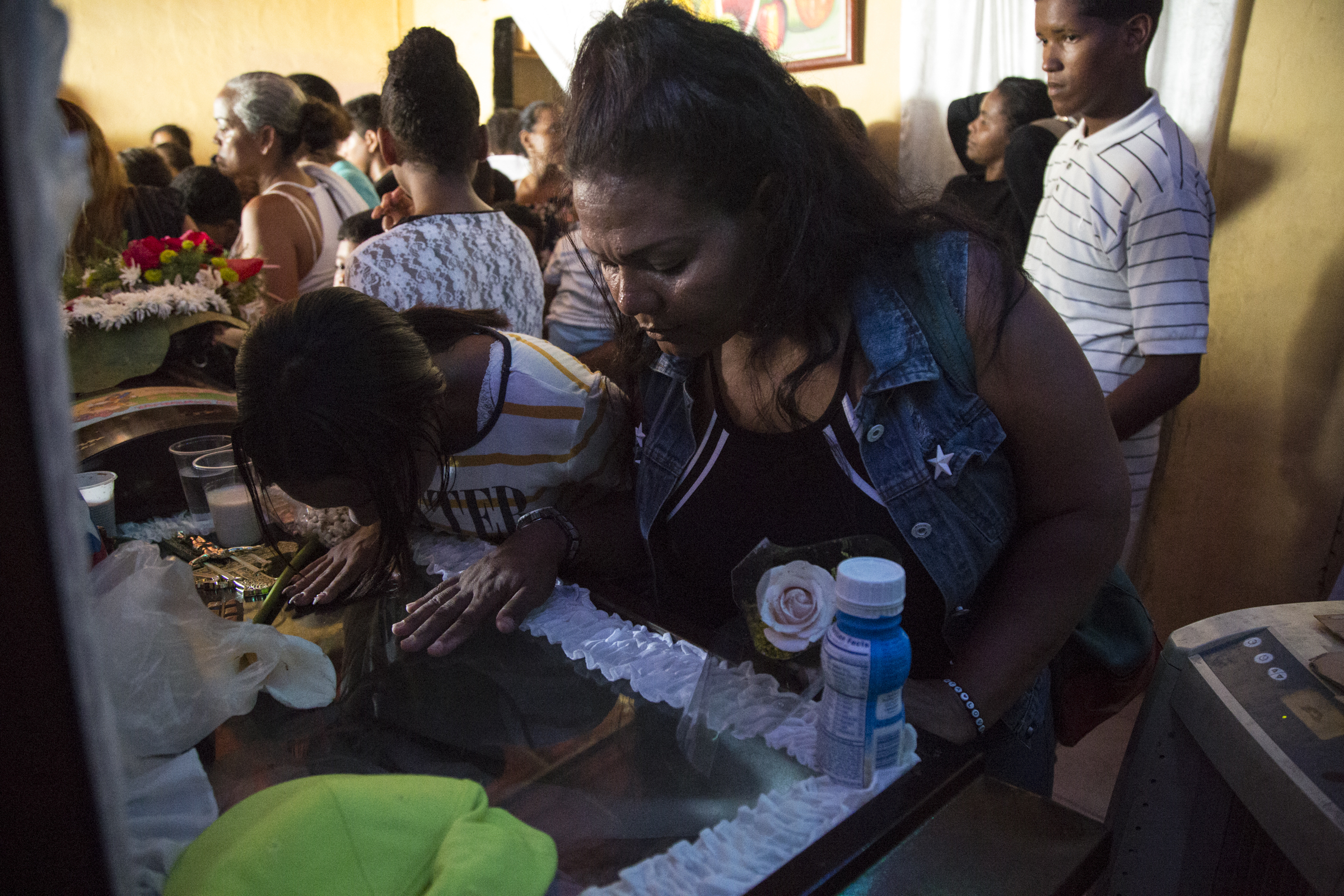
Wendy González celebrated both Yeiderberth’s birthday and burial. He would have turned 9 that day. La Guaira, 2019. Photo: Luis Morillo
No one to help
Since the Simón Bolívar Foundation cut the aid, it hasn’t made any comments regarding the program or the death of the five children, all of them from poor families. 30 children and teenage candidates awaited for a bone marrow transplant, 20 of them requiring urgent surgery. Four have now passed and new cases may show up soon as 16 children remain in critical condition.
“I felt invisible for this whole process,” said Gilberto, after singing some vallenato songs to Erick’s coffin, a playlist made by Erick himself. “No one wants to help, or hear us. The press is our only hope and we aren’t afraid to talk anymore.”
Dr. Vera has complained about mothers and family members of hospitalized children talking to the media only after their children die, because they do receive threats inside the hospital.
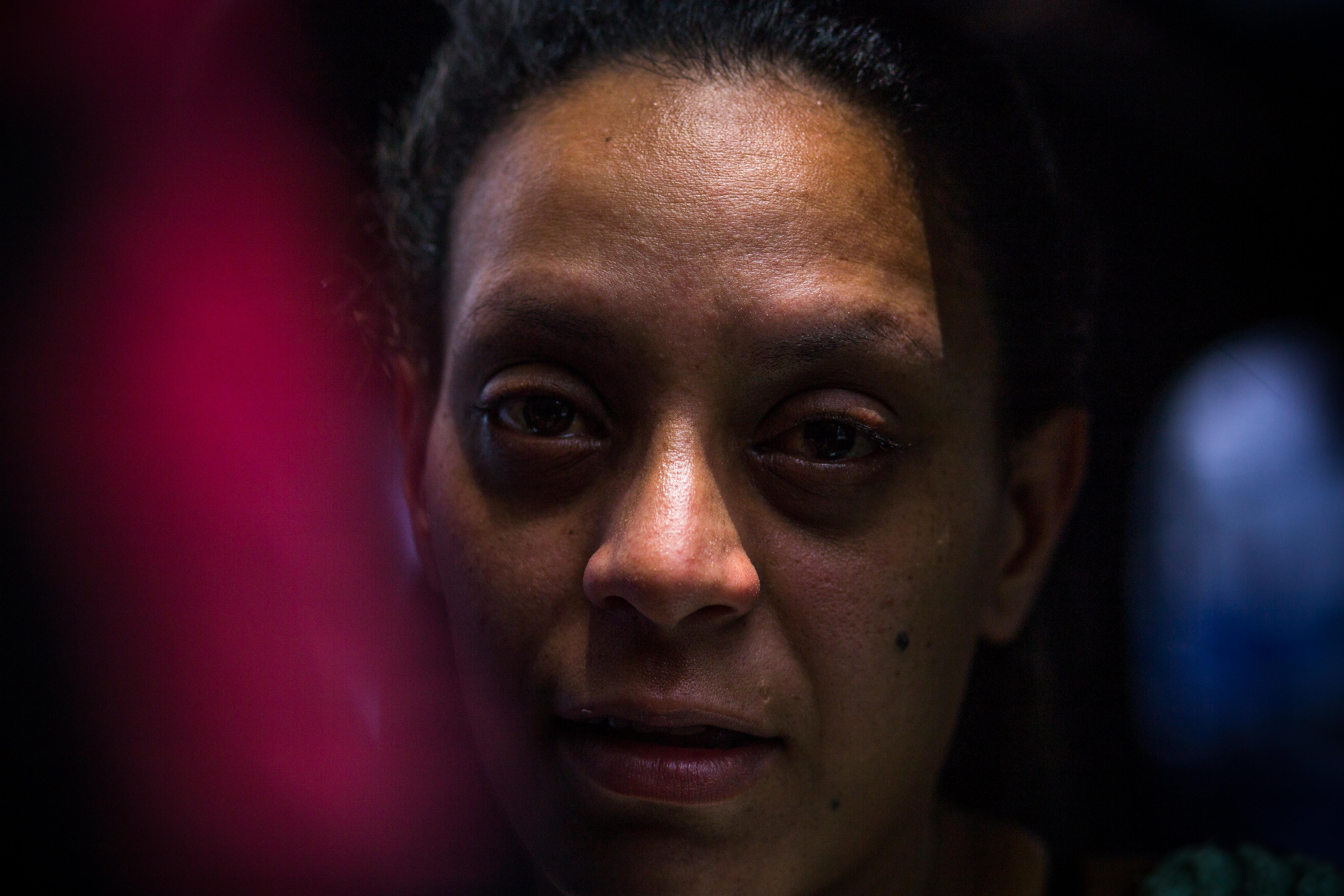
Jessica, Erick’s mother, mourns her son at his wake. Dark, purple bags circle her eyes and her expression has gone from worried and impatient to broken and hopeless. Petare, 2019. Photo: Cristian Hernández.
“We’ve been desperate for the last year, we have nowhere to go,” said Jessica, covering her face to hide the tears. “All we can do is wait for our children to die peacefully, but even that was taken from us. My son needed Propofol to die without pain, and they wouldn’t give him the medicine. They’ve taken everything from us.”
Her pictures with Erick show how much her face has changed during the past weeks.
“We just wanted to see him go peacefully, but Erick died in pain, scared. No one will ever make it up to us after that.”
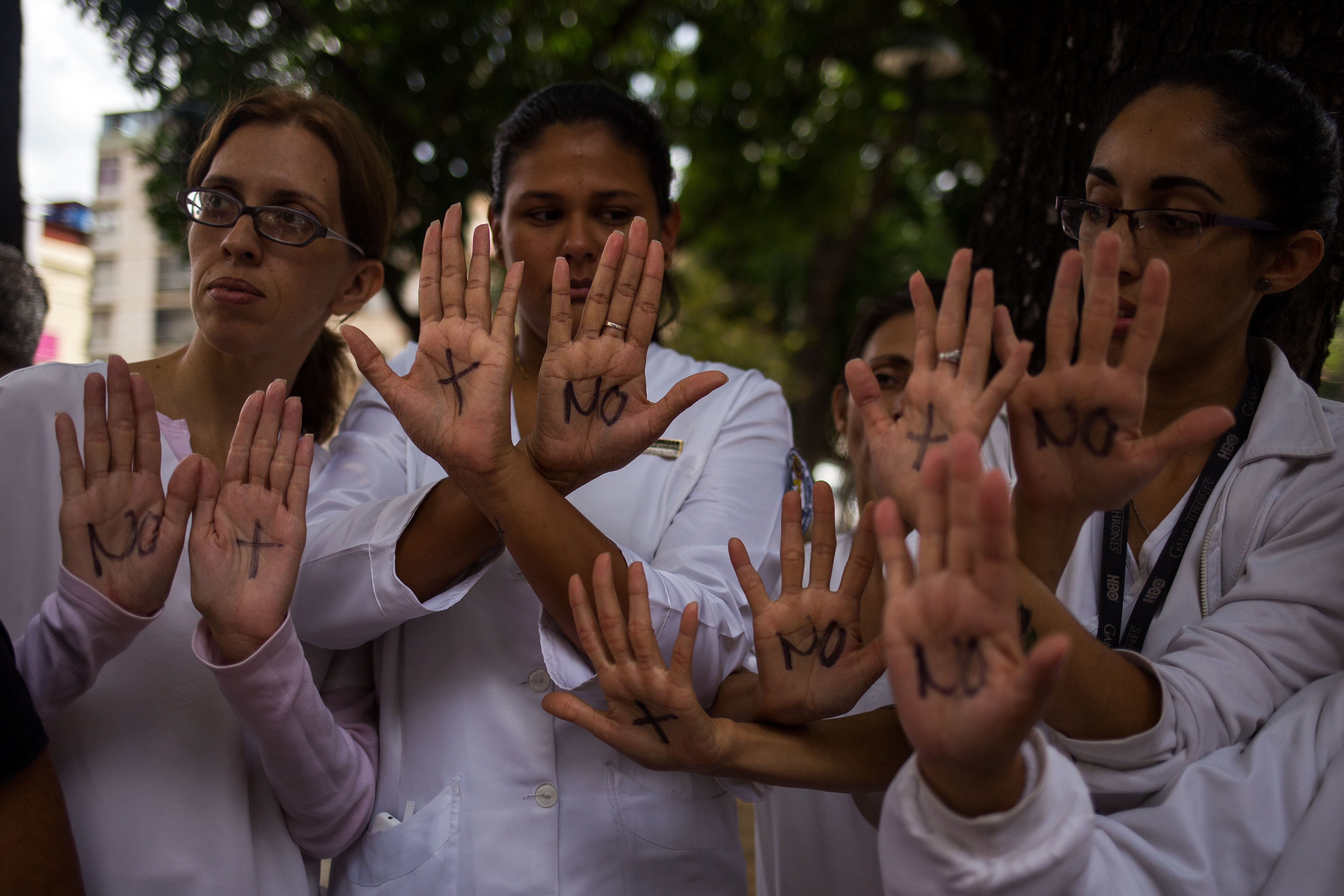
Nurses protest in fron of the JM de los Rios Children’s Hospital and ask the government to send them humanitarian aid. They claim that, besides all the problems, many staff members have left with a psychological leave due to the hard conditions they have to endure. Caracas, 2019. Photo: Cristian Hernández.
Caracas Chronicles is 100% reader-supported.
We’ve been able to hang on for 21 years in one of the craziest media landscapes in the world. We’ve seen different media outlets in Venezuela (and abroad) closing shop, something we’re looking to avoid at all costs. Your collaboration goes a long way in helping us weather the storm.
Donate



